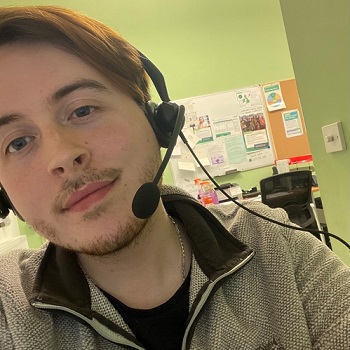
Hello, I’m Daniel, a Year 5 medical student.
Like most of my peers, I applied to medical school because I wanted a life where I could spend my time caring for those in need. Since then, it has become apparent that it is easy to lose sense of our own wellbeing.
From a young age we are taught to put others before ourselves, and that medicine should be the focus of our lives. Despite efforts to discourage this culture of self sacrifice, it can still feel like our only duty is to caring for others, or learning to do so. This is not a sustainable mindset to have, and is not the most beneficial one for our future patients.
Alongside my time at medical school, I have also volunteered for various suicide or emotional support helplines, answering calls from those in distress. It is in this role, more than my medical education, that I could truly appreciate the value of looking after myself, in order to make sure that I can provide proper support to others.
The value of reflection
One of the most valuable skills I have learnt in my volunteering, for maintaining good emotional health, is reflection. After every shift I have, I will be encouraged to debrief about what happened during my shift, and be given a space to reflect over the calls I’ve taken. This gives me the opportunity to explore how those interactions made me feel, and ensure that I won’t be taking them home with me. This is a widely accepted norm for my colleagues and I.
Despite medical students working in clinical environments, where we are exposed to many forms of emotional stress, the same culture doesn’t exist. At a young age, we’re in situations which others cannot begin to comprehend. We’re exposed to death and incurable illness, remission and beginning of life, as well as uncertainty and anxiety in unbelievable levels. This is a lot for anybody to take on, nevertheless someone in their late teens or early 20s.
I know that after a difficult day on placement, I find it helpful to talk about my day to my friends, to help me process what has happened. This isn’t something we should be scared to do, and realistically, we should be encouraged to take on this healthy method of dealing with our emotions. It’s always possible to talk to doctors and nurses when we are on placement if something has been difficult; or to talk to our medical student friends who will be able to empathise with what we’ve seen or experienced. Learning to decompress is an integral skill for a life in a caring profession.
Burnout, recognising and preventing it
Even with these positive strategies for making sure things don’t get too much, they still can. Outwith clinical placements, we have a monumental amount of academic work to do, and this comes with its own pressure. Every medical student I know is far too familiar with the word ‘burnout’. I’ve personally felt burnout so many times that I can always know what it’s coming. It’s only recently that I’ve realised that I can take steps to stop becoming fully burned out, before it happens.
This is my own form of self reflection; recognising signs that I’m not functioning at my best, noticing when I’m beginning to lose my direction, and seeing my motivation slip. When this happens, I know that I can prevent it going further, by slowing down, and speaking about how I feel – but sometimes imposter syndrome will make this difficult to do. I’m still on the journey to be able to handle burnout, but I know in order to care for others I need to regain control of it. This is the reason why I believe self reflection is such an important aspect of being a medical student.
Compassion fatigue
A particular form of burnout related to caring, is called compassion fatigue. This is when emotional situations take its toll on our ability to empathise. It is another concept that I have heightened awareness of in my role as a suicide hotline volunteer. If I let myself be affected by the emotional demands of medicine, then I won’t be providing the care that patients deserve. It’s vitally important that we recognise this, and know that all patients deserve empathy, and we should be able to give this.
Nobody is expected to be untouchably resilient – it’s not human to be so. The moment that emotional situations don’t affect us is the moment we are becoming complacent, and that is when we are unable to provide appropriate support and compassion to patients. Compassion fatigue can be avoided by recognising the ways in which emotionally demanding situations effect us, and seeking support when things become too much for us to deal with on our own.
I can’t pretend to know all of the answers to how best to take care of a carer – but I hope that my sharing of my own experiences and some of my own journey, could encourage someone else to start to reflect on how to incorporate looking after yourself into the role of a medical student.


